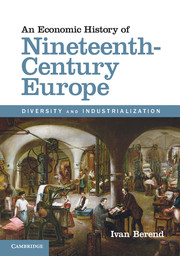Book contents
- Frontmatter
- Contents
- List of boxes
- List of figures
- List of maps
- List of tables
- Preface
- Introduction
- Part I Gradual revolution
- Part II Successful industrial transformation of the West
- Chapter 2 Knowledge and the entrepreneurial state
- Chapter 3 Agriculture, transportation, and communication
- Chapter 4 The organization of business and finance
- Chapter 5 Three versions of successful industrialization
- Chapter 6 The miracle of knowledge and the state: Scandinavia
- Chapter 7 Demographic revolution, transformation of life, and standard of living
- Chapter 8 The Europeanization of Europe
- Part III The peripheries: semi-success or failure of modern transformation
- References
- Index
- References
Chapter 8 - The Europeanization of Europe
from Part II - Successful industrial transformation of the West
Published online by Cambridge University Press: 05 December 2012
- Frontmatter
- Contents
- List of boxes
- List of figures
- List of maps
- List of tables
- Preface
- Introduction
- Part I Gradual revolution
- Part II Successful industrial transformation of the West
- Chapter 2 Knowledge and the entrepreneurial state
- Chapter 3 Agriculture, transportation, and communication
- Chapter 4 The organization of business and finance
- Chapter 5 Three versions of successful industrialization
- Chapter 6 The miracle of knowledge and the state: Scandinavia
- Chapter 7 Demographic revolution, transformation of life, and standard of living
- Chapter 8 The Europeanization of Europe
- Part III The peripheries: semi-success or failure of modern transformation
- References
- Index
- References
Summary
Colonial Western Europe in the globalizing world
Europe began to build global empires beginning in the early modern period. The Iberian countries were the first to do so, and were followed by the Northwest European countries in the seventeenth century. As the etymology of the word suggests, colonialism was the migration of European settlers to colonies in foreign territories abroad. Between the sixteenth and twentieth centuries, roughly 60 million Europeans established European “colonies” in America, Africa, and Asia. Modern colonialism, however, was launched by conquest or coerced agreements along with external control and rule. European powers controlled more than a third of the world by 1800. Nevertheless, the nineteenth century became the real culmination of the “age of empire,” as Eric Hobsbawm called that process between 1875 and 1914 (Hobsbawm, 1989).
The period following France's defeat in the Napoleonic wars has been often dubbed the Pax Britannica, when Britain emerged as an unchallenged superpower and began to conquer or at least control most of the world. By that time Britain had already possessed a large empire, which included North America, Australia, and major trading positions in India. The nineteenth century, however, was Britain's imperial century. Britain's initial goal was to build an informal empire (Gallagher and Robinson, 1953), but, amidst a wild and desperate race for colonies after the 1870s, it “formalized” its empire to ward off any outside attempts to take it over. Imperial rule was also crucial for preventing the local elites in its colonies from seizing control of their plantation economies (Frieden, 1994). John A. Hobson, a British economist, drew attention to this phenomenon in his influential work, Imperialism. A Study, in 1902. “Imperialism is the natural product of the economic pressure of a sudden advance of capitalism which cannot find occupation at home and needs foreign markets for goods and for investments” (Hobson, 1902, 85).
- Type
- Chapter
- Information
- An Economic History of Nineteenth-Century EuropeDiversity and Industrialization, pp. 284 - 314Publisher: Cambridge University PressPrint publication year: 2012



